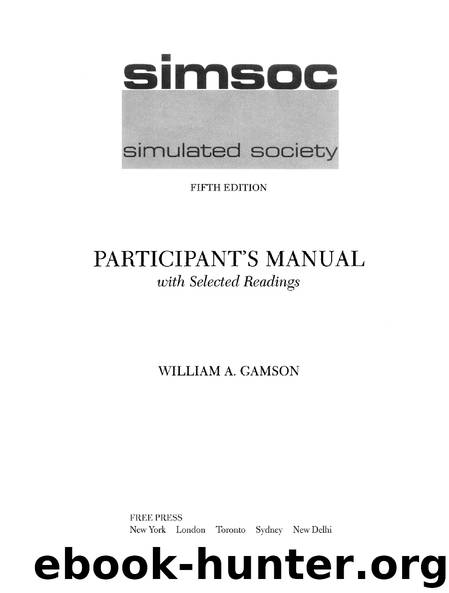Simsoc by William A. Gamson

Author:William A. Gamson
Language: eng
Format: epub
Publisher: Free Press
LEADERSHIP AND COLLECTIVE PURPOSE
To answer such questions we must proceed to the formidable task of seeing the role of leadership, as we have defined it, in historical causation. Let us take stock of the definition. Leadership is the reciprocal process of mobilizing, by persons with certain motives and values, various economic, political, and other resources, in a context of competition and conflict, in order to realize goals independently or mutually held by both leaders and followers. The nature of those goals is crucial. They could be separate but related; that is, two persons may exchange goods or services or other things in order to realize independent objectives. Thus Dutchmen (colonists in America) give beads to Indians in exchange for real estate, and French legislators trade votes in the Assembly on unrelated pieces of legislation. This is transactional leadership. The objective in these cases is not a joint effort for persons with common aims acting for the collective interests of followers but a bargain to aid the individual interests of persons or groups going their separate ways.
Leaders can also shape and alter and elevate the motives and values and goals of followers through the vital teaching role of leadership. This is transforming leadership. The premise of this leadership is that, whatever the separate interests persons might hold, they are presently or potentially united in the pursuit of “higher” goals, the realization of which is tested by the achievement of significant change that represents the collective or pooled interests of leaders and followers.
Both forms of leadership can contribute to human purpose. If the transactions between leaders and followers result in realizing the individual goals of each, followers may satisfy certain wants, such as food or drink, in order to realize goals higher in the hierarchy of values, such as aesthetic needs. The chief monitors of transactional leadership are modal values, that is, values of means—honesty, responsibility, fairness, the honoring of commitments—without which transactional leadership could not work. Transformational leadership is more concerned with end-values, such as liberty, justice, equality. Transforming leaders “raise” their followers up through levels of morality, though insufficient attention to means can corrupt the ends.
Thus both kinds of leadership have moral implications. How can we define that morality? Summoned before the “bar of history,” Adolf Hitler would argue that he spoke the true values of the German people, summoned them to a higher destiny, evoked the noblest sacrifice from them. The most crass, favor-swapping politician can point to the followers he helps or satisfies. Three criteria must be used to evaluate these claims. Both Hitler and the politician would have to be tested by modal values of honor and integrity—by the extent to which they advanced or thwarted fundamental standards of good conduct in humankind. They would have to be judged by the end-values of equality and justice. Finally, in a context of free communication and open criticism and evaluation, they would be judged in the balance sheet of history by their impact on the well-being of the persons whose lives they touched.
Download
This site does not store any files on its server. We only index and link to content provided by other sites. Please contact the content providers to delete copyright contents if any and email us, we'll remove relevant links or contents immediately.
Hit Refresh by Satya Nadella(8338)
The Compound Effect by Darren Hardy(7560)
Change Your Questions, Change Your Life by Marilee Adams(6641)
Nudge - Improving Decisions about Health, Wealth, and Happiness by Thaler Sunstein(6633)
The Black Swan by Nassim Nicholas Taleb(6192)
Daring Greatly by Brene Brown(5642)
Deep Work by Cal Newport(5465)
Principles: Life and Work by Ray Dalio(5322)
Rich Dad Poor Dad by Robert T. Kiyosaki(5149)
The Myth of the Strong Leader by Archie Brown(4789)
Man-made Catastrophes and Risk Information Concealment by Dmitry Chernov & Didier Sornette(4736)
Big Magic: Creative Living Beyond Fear by Elizabeth Gilbert(4723)
The Slight Edge by Jeff Olson(4722)
Discipline Equals Freedom by Jocko Willink(4636)
Digital Minimalism by Cal Newport;(4543)
The Motivation Myth by Jeff Haden(4528)
Stone's Rules by Roger Stone(4416)
Management Strategies for the Cloud Revolution: How Cloud Computing Is Transforming Business and Why You Can't Afford to Be Left Behind by Charles Babcock(4131)
The Doodle Revolution by Sunni Brown(4043)
